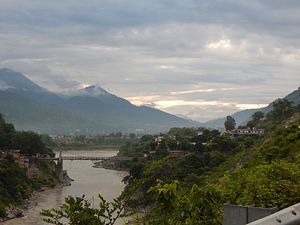On June 19, Ram Madhav, the National General Secretary of India’s Bharatiya Janata Party (BJP), announced that the party would be withdrawing from a coalition with the People’s Democratic Party (PDP) in Jammu and Kashmir. The end of the three-year and fragile alliance culminated with the resignation of Mehbooba Mufti as Chief Minister of the state, placing the state under the rule of Governor N.N. Vohra, until either a new coalition is formed, or elections are scheduled.
The BJP blamed increasing violence in the state, saying “there is grave concern over the deteriorating security situation in the State,” and placed the blame squarely on the PDP. Madhav, in an interview with Hindustan Times, also said that the alliance was a “rainbow alliance” and “By its very nature rainbows are short lived.” Mufti responded, saying that the BJP was approaching the state as “enemy territory” and that “we can’t have a muscular policy here.”
The fragile alliance came together despite vastly different ideologies in 2015, marking the first time the BJP was in power in the state. However, the alliance remained uneasy, and came under increasing stress recently following accusations of support by state BJP leaders of the accused in a horrific rape of an eight-year-old in Kathua, as well as the Centre’s decision not to extend a ceasefire in the valley during the month of Ramzan.
With the imposition of direct rule in the state, Jammu and Kashmir is likely to face a hardline security policy directed by New Delhi, with increasing counter-insurgency operations, according to reports. Indeed, according to a retired commander who served in Jammu and Kashmir, “the army and other security forces will find it easier to operate under the governor. The Unified Command will be under the governor, instead of the CM. This means political sensitivity won’t come in the way of operations.” This focus on counterinsurgency also comes at a time where the Central Government’s focus has been on the Amarnath Yatra, scheduled to begin on June 28.
However, as Happymon Jacob, an Associate Professor at Jawaharlal Nehru University, notes “An uncompromising militarist approach… would inevitably mean more militant recruitments from within Kashmir and consequent civilian, military and militant casualties.” Given that the counterinsurgency operations are reported to be targeted in the districts Shopian, Kulgam, Anantnag and Pulwama, which have been hotbeds of militant activity in South Kashmir, troubled times may be ahead for the state.
Moreover, a forceful security policy towards Jammu and Kashmir will further complicate politics in the state. South Kashmir has traditionally been the base of support for the PDP but voters have criticized Mehbooba Mufti’s alliance and her policies in office. The party had previously been a strong third voice in state politics, occupying a space between advocates of separatism and the mainstream parties, promoting a position of “soft-separatism.” During its alliance with the BJP, however, Mufti was perceived to have traded her soft-separatism for “ultranationalism.” As the party reels from its fall from power and its lack of political legitimacy, a reversal back to soft-separatism would further deepen divisions in the state under direct rule.
Moreover, given the results of the previous elections in the state, forming a new coalition will not be easy. No single party holds a majority, with the PDP serving as the single largest party with 28 legislators. Without the BJP and its 25 legislators, the party will have to depend on support from both the National Conference’s (NC) 15 legislators and the Indian National Congress’ (INC) 12 legislators. The PDP and the NC are political rivals, and the INC has already ruled out a coalition with the PDP, suggesting that direct rule may not be short-lived.
While former Chief Minister of Jammu and Kashmir and Vice President of the NC, Omar Abdullah, has called for fresh elections to take place sooner rather than later, that presents political risks as well. Analysts have noted that the fractured mandate of the 2014 election “reflected the fragmented polity of a State torn asunder by violence.” With violence and militancy on the uptick in the last three years, it is far from certain that fresh elections will result in a clear winner or a stable government in the state.
Given the political and security atmosphere in the state, Jammu and Kashmir faces significant hardship in the near future. Kashmir is also likely to feature prominently in the national political dialogue as India looks towards the 2019 elections. Indeed, as the BJP hopes to mobilize its core constituency by withdrawing from a coalition with the PDP, opposition parties, which have been discussing a united front going into the 2019 elections, will also organize with renewed resolve. It is clear, therefore, that the decisions made by the BJP in Jammu and Kashmir are likely to have meaningful implications for the rest of the country.

































